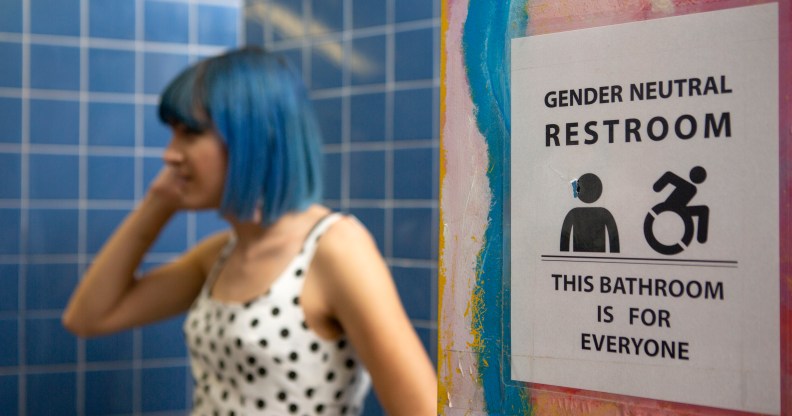An overwhelming majority of young people think trans people should use whichever bathroom they want

Stock photo of a transgender person in an all-gender bathroom. (Creative Commons/Zackary Drucker/Broadly Gender Spectrum Collection)
Trans people should be allowed to use whatever bathroom they feel most comfortable in because they “are not sexual perpetrators”, said the majority of youth respondents in a study published by the Journal of Homosexuality.
The University of Michigan research found that 79 percent of young people aged 14 to 24 believe that bathroom use should not be restricted according to a person’s trans status.
This majority, who supported trans people using the bathroom they felt most comfortable in, said that their decision was based on four key factors.
These were that bathroom use is private and should be a personal decision; that bathroom choice is a matter of freedom and human rights; that trans people are not sexual perpetrators; and that forcing trans people to use specific bathrooms puts them at risk.
Michigan researchers analysed the responses of 683 people to a weekly text-messaging service, which includes participants from across the US although the majority are from Michigan.
Lead author Halley Crissman said: “Contrary to current policy in many schools, the young people we polled do not support restrictions on bathroom use by transgender people.
“This suggests that young people’s views on bathroom use by transgender individuals differ from the narratives often represented in public debates.”
The findings come as so-called “bathroom bills” are being increasingly debated in the US, and trans rights are beginning to feature in the campaigns of 2020 presidential hopefuls.
However, they differ from the results of Gallup polling in May 2019, which found that views on bathroom policies in respect of the trans population were still divided on whether trans people could use the bathrooms they wanted to.
The national polling found that 51 percent of Americans said trans individuals should have to use the restroom corresponding with their birth gender. Forty-four per cent said trans people should use the restroom that corresponds with their gender identity.
But the Gallup poll only surveyed people in the US aged 18 and over, whereas the University of Michigan included younger participants.

